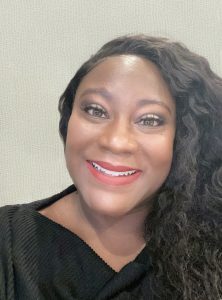A message from Ujima Sands
 As you’ll discover in this email, across Total Talent Management and throughout UW Human Resources we have been planning and implementing changes to enhance programs and services for employees, our clients and the University community.
As you’ll discover in this email, across Total Talent Management and throughout UW Human Resources we have been planning and implementing changes to enhance programs and services for employees, our clients and the University community.
I am excited about the change that lies ahead in UWHR — and yet at the same time I recognize that even changes that are intentional and welcome can take an emotional toll on everyone involved. I would also like to recognize that you or those on your team may be experiencing a number of feelings as you navigate this election season; I encourage you to explore this thoughtful collection of resources curated by The Whole U.
As I reflect on conversations with folks from across campus and in my inner circle, it’s clear that, as leaders, we tend to carry a great deal of weight — from our home lives, the workplace and the world — into everything we do. Even when we can’t catch our breath, we feel we must simply keep pushing forward no matter what. Quite frankly, that model is not sustainable.
I don’t have a cure but I would like to share the mantra of steady as we go. We are all truly in this together, and as leaders we can apply approaches and strategies that help keep ourselves and each other steady. Part of that is letting go of the idea of needing to know or be everything.
Being comfortable with ambiguity is often extolled as a virtue, and I agree it is a strength. However, being comfortable with ambiguity isn’t just about being able to deal with uncertainty or being able to make decisions without all the information. For me, it’s not succumbing to the pressure that leaders sometimes feel to be the expert, fill in the gaps and provide all the answers. It’s about not attaching my lack of knowing to my sense of self or self-worth.
I believe it’s important to subvert mainstream culture power structures that insist that leaders are experts who hold all the knowledge. What’s needed instead is authenticity and transparency.
Rather than feeling as if I must know everything all the time, I prefer to recognize that we are building the bridge as we’re walking over it and that even those who appear to don’t have all the answers either.
This mindset also leads to practicing withness: Rather than being the expert-leader, you can choose to be with your colleagues and team members in moments of discomfort or discovery. When I do this, those moments become about what we are making together, acknowledging the strength of our collective energy and thought.
Another approach that I value is recognizing our common humanity, whether that’s with team members, neighbors or strangers halfway across the world. Thinking of people as individuals, rather than, for instance, as representatives or members of certain groups, may help you cultivate authentic care for others, even if you don’t share the same values or beliefs. You can also extend this authentic care to yourself.
Now more than ever, we need the strength of each other. It takes work and intention, but I encourage you to practice being more compassionate with others and with yourself; recognizing everyone’s inherent fallibility, including your own; and giving others and yourself grace. Not only is it good for our hearts and minds, an empathetic approach can help us contend with and navigate change.
Finally, there are other, valuable ways of knowing beyond the leader-expert construct. We need to practice shutting out the noise and take measures to keep ourselves steady and whole. When we’re able to root ourselves, we are able to hold communion with ourselves and discover, or rediscover, our fundamental truths and passions. That, in turn, can ground and energize us in every aspect of our lives.